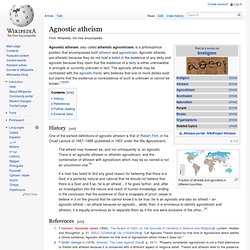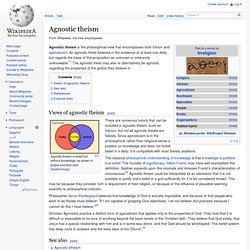

Religious views of Albert Einstein. Agnostic atheism. Agnostic atheism, also called atheistic agnosticism, is a philosophical position that encompasses both atheism and agnosticism.

Agnostic atheists are atheistic because they do not hold a belief in the existence of any deity and agnostic because they claim that the existence of a deity is either unknowable in principle or currently unknown in fact. The agnostic atheist may be contrasted with the agnostic theist, who believes that one or more deities exist but claims that the existence or nonexistence of such is unknown or cannot be known.[1][2][3] History[edit] Fraction of atheists and agnostics in different countries One of the earliest definitions of agnostic atheism is that of Robert Flint, in his Croall Lecture of 1887–1888 (published in 1903 under the title Agnosticism).
Dear Atheists « BubbleGum GraveYard. March 2, 2012 I am an agnostic atheist.

It’s a real thing . Agnostic theism. Agnostic theism is the philosophical view that encompasses both theism and agnosticism.

An agnostic theist believes in the existence of at least one deity, but regards the basis of this proposition as unknown or inherently unknowable.[1] The agnostic theist may also or alternatively be agnostic regarding the properties of the god(s) they believe in. Views of agnostic theism[edit] Agnostic theism is belief but without knowledge, as shown in purple and blue (see Epistemology). Richard Dawkins: I can't be sure God does not exist.